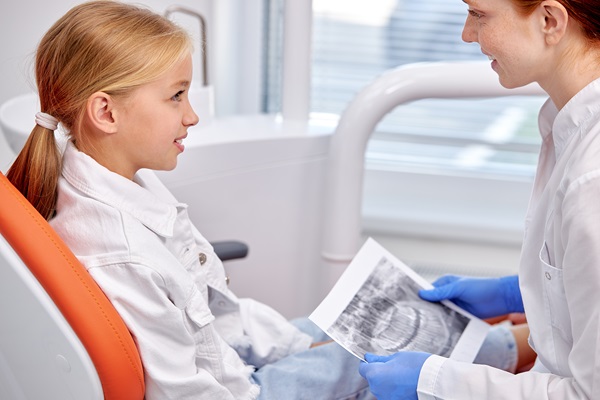What Is Painless Pediatric Dentistry?

Curious about painless pediatric dentistry? Read on to learn more. For many children, simply mentioning the word dentist can incite fear and anxiety. Unfamiliar surroundings, the sound of dental equipment, and the possibility of discomfort can make even the bravest child apprehensive. Painless pediatric dentistry, however, seeks to change this narrative. It represents a shift toward patient-focused care, ensuring every child's dental experience is as comfortable and stress-free as possible.
An overview of painless pediatric dentistry
Painless pediatric dentistry aims to improve children's experience at the dental office. The following are some of the features that can be found at a pediatric dentistry office:
Specialized training for dentists
The cornerstone of painless pediatric dentistry lies in the extensive training these dentists undergo. Beyond their basic dental degree, pediatric dentists spend an additional two to three years specializing in children's oral health. This rigorous training equips them to handle children's dental needs and behavioral aspects, from infants to adolescents.
Child-friendly environment
The ambiance of a pediatric dental clinic can be a stark contrast to the sterile environment of regular dental offices. A pediatric dentist's office typically features bright colors, playful themes, and a treasure chest of toys for children, making their visit feel more like a fun outing than a dental appointment. This uplifting environment reduces anxiety and makes children feel more comfortable.
Advanced painless techniques
Incorporating the latest advancements in dental technology, painless pediatric dentistry focuses on minimally invasive techniques. Whether it is using laser dentistry to treat cavities without the need for drilling or sedation dentistry to ensure a pain-free experience, the emphasis is always on maximizing comfort. Some options typically available to patients include oral sedation, nitrous oxide, and IV sedation.
Emphasis on preventive care
Painless pediatric dentistry focuses more on preventive care instead of just treating dental problems. Regular check-ups, sealants, fluoride treatments, and patient education are major elements of the care provided. By catching potential issues early and instilling good oral habits from a young age, these dentists lay the foundation for a lifetime of dental health.
Communication tailored to children
Painless pediatric dentists have a knack for communicating with children. They use simple language, visual aids, and interactive demonstrations to explain dental procedures. These dentists reduce fear and build comfort by demystifying the process and making children active participants in their oral care.
Emphasis on parental involvement
A significant aspect that sets painless pediatric dentistry apart is the inclusion of parents in the dental journey. Dentists take the time to advise parents on best practices, diet recommendations, and potential dental challenges that their children might face. This collaborative approach ensures that the child receives consistent care at the office and at home.
Special needs consideration
Children with special needs often require a specialized approach to dental care. Painless pediatric dentists are trained to provide specialized care, ensuring that every child, irrespective of their challenges, can achieve optimal oral health with minimum discomfort.
Focus on building long-term relationships
The relationship between a child and their dentist is critical. Painless pediatric dentists prioritize building a rapport with their young patients. By striving to make each visit positive, they address immediate dental concerns and foster a lifelong positive attitude toward dental health.
Use of modern distraction techniques
Gone are the days when the only distraction in a dental clinic was a ceiling-mounted poster. Painless pediatric dentistry utilizes modern technology to its advantage. From VR headsets to in-chair entertainment systems, they employ various methods to divert attention, making the dental procedure easier to undergo.
A holistic approach to dental health
Understanding that dental health does not exist in isolation, these specialized dentists adopt a holistic approach. When creating a dental care plan, they consider factors like a child's overall health, medications, habits, and even sleep patterns. This comprehensive approach ensures that every aspect of a child's well-being is considered.
In conclusion
Painless pediatric dentistry comprises a great combination of advanced techniques, child psychology, and genuine dedication to patient comfort. It goes beyond just treating teeth, aiming to provide a holistic dental experience that caters to every child's physical and emotional needs.
For parents seeking the best for their child's dental health, this dental specialty offers the reassurance of gentle and comprehensive care tailored to suit their child's individual needs. In entrusting their child's dental health to such specialists, parents can ensure a painless experience and set the stage for a lifetime of positive dental habits and attitudes.
Request an appointment here: https://nettsmiles.com or call Nett Pediatric Dentistry & Orthodontics at (623) 759-7658 for an appointment in our Phoenix office.
Check out what others are saying about our services on Yelp: Read our Yelp reviews.
Recent Posts
In pediatric dentistry, dentists assess how certain food types affect oral health and make recommendations accordingly. Common childhood snacks can harm teeth by breaking down enamel and contributing to periodontal diseases, such as sugar-filled yogurt packs, cookies, and citrus fruits.This review takes a closer look at snacks parents can provide for their children that are…
Once teething starts, you should pay close attention to your child's teeth to avoid tooth decay, cavities, and other oral health problems. A dentist specializing in pediatric dentistry might advise against pacifiers and other items that might interfere with the healthy development of their oral tissues. Sucking on a pacifier is common among infants and…
Pediatric dentistry is a vital part of a child's healthcare team. They are responsible for the oral health of babies, children, and adolescents. A pediatric dentist has the education and experience to care for a child's unique dental needs. In addition, they can provide preventive care, diagnosis, and treatment of various dental problems.Parents need to…
Pediatric dentistry works with parents and children to keep gums and teeth healthy. Brushing daily may be an important part of oral care, but it is not enough. Flossing must be a habit in kids as well. If you want to know more about the importance of daily flossing, here are the details straight from…


